I'm making an application with JavaFX and Scene Builder.
I have two controllers:Controller and FontController
I have Main class that launch my program and open Stage with first fontroller (Controller)
public class Main extends Application {
public static void main(String[] args) {
launch(args);
}
@Override
public void start(Stage primaryStage) throws Exception {
try {
Parent root = FXMLLoader.load(getClass().getResource("/card/card.fxml"));
Scene scene = new Scene(root, 1600, 600);
primaryStage.setScene(scene);
scene.getStylesheets().add(getClass().getResource("style.css").toExternalForm());
primaryStage.initStyle(StageStyle.UNDECORATED);
primaryStage.setMaximized(true);
primaryStage.setResizable(true);
primaryStage.getIcons().add(new Image("card/resources/logo-icon.png"));
primaryStage.show();
//adding resize and drag primary stage
ResizeHelper.addResizeListener(primaryStage);
//assign ALT+ENTER to maximize window
final KeyCombination kb = new KeyCodeCombination(KeyCode.ENTER, KeyCombination.CONTROL_DOWN);
scene.addEventHandler(KeyEvent.KEY_PRESSED, new EventHandler<KeyEvent>() {
@Override
public void handle(KeyEvent event) {
if (kb.match(event)) {
primaryStage.setMaximized(!primaryStage.isMaximized());
primaryStage.setResizable(true);
}
}
});
} catch (Exception e) {
e.printStackTrace();
}
}
}
There is a label and a button in Controller. When I click on the button a method is called and new window with second controller appears(FontController):
@FXML private Button btnFont;
@FXML private Label category1
@FXML
void changeFont(ActionEvent event) {
try {
FXMLLoader fxmlLoader = new
FXMLLoader(getClass().getResource("font.fxml"));
Parent rootFont = (Parent) fxmlLoader.load();
Stage stage = new Stage();
stage.setTitle("Select Font");
stage.setScene(new Scene(rootFont));
stage.show();
} catch (Exception e) {
System.out.println("can't load new window");
}
}
There is the button "OK" and label in FontCOntroller:
@FXML private Label fontLabel;
@FXML private Button btnFontOk;
Please tell me, what should I do to send and apply text from label in FontController when I click on the burtton "OK" to label in Controller?

